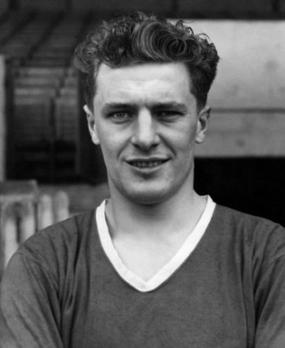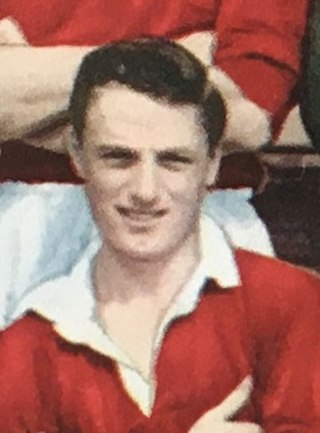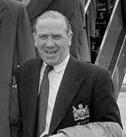
Sir Robert Charlton was an English professional footballer who played as a midfielder or centre-forward. Widely considered one of the greatest players of all time, he was a member of the England team that won the 1966 FIFA World Cup, the year he also won the Ballon d'Or. He finished second in the Ballon d'Or voting in 1967 and 1968. He played almost all of his club football at Manchester United, where he became renowned for his attacking instincts, passing abilities from midfield, ferocious long-range shooting from both left and right foot, fitness, and stamina. He was cautioned only twice in his career; once against Argentina in the 1966 World Cup, and once in a league match against Chelsea. With success at club and international level, he was one of nine players to have won the FIFA World Cup, the European Cup and the Ballon d'Or. His elder brother Jack, who was also in the World Cup–winning team, was a former defender for Leeds United and also for ten years was the manager of the Republic of Ireland.

The Munich air disaster occurred on 6 February 1958 when British European Airways Flight 609 crashed on its third attempt to take off at Munich-Riem Airport in Munich, West Germany. The aircraft was carrying the Manchester United football team, nicknamed the "Busby Babes", along with supporters and journalists. There were 44 people on board, 20 of whom died at the scene. The injured, some unconscious, were taken to Munich's Rechts der Isar Hospital, where three more died, resulting in 23 fatalities with 21 survivors.

Duncan Edwards was an English footballer who played as a left-half for Manchester United and the England national team. He was one of the Busby Babes, the young United team formed under manager Matt Busby in the mid-1950s, playing 177 matches for the club. He was noted for his physical strength, toughness, and level of authority on the pitch, and has been ranked amongst the toughest players of all time. One of eight players who died as a result of the Munich air disaster, he survived initially but succumbed to his injuries in hospital two weeks later. Many of his contemporaries have described him as one of the best, if not the best, players with whom they had played.

Sir Alexander Matthew Busby was a Scottish football player and manager, who managed Manchester United between 1945 and 1969 and again for the second half of the 1970–71 season. He was the first manager of an English team to win the European Cup and is widely regarded as one of the greatest managers of all time.

Roger William Byrne was an English footballer who played as a full-back and captain of Manchester United. He died at the age of 28 in the Munich air disaster. He was one of the eight Manchester United players who lost their lives in the disaster on 6 February 1958. He made 33 appearances for the England national team.

Geoffrey Bent was an English footballer who played as a left back for Manchester United from 1948 until 1958. He was one of the Busby Babes, the young team formed under manager Matt Busby in the mid-1950s. Bent only made twelve first-team appearances for Manchester United, who already had an international-quality left back in Roger Byrne. Modern writers speculate that at most other teams Bent would have been a regular starter, and he was the subject of interest from fellow First Division clubs, but Busby refused to let him leave. He was one of eight Manchester United players who died in the Munich air disaster, when their aircraft crashed on its third attempt to take off from a slush-covered runway at Munich-Riem Airport after a European Cup match in Belgrade.

James Patrick Murphy was a Welsh footballer who made over 200 appearances for West Bromwich Albion and won 15 caps for the Wales national team, which he later managed. Murphy is most famous for being an influential figure at Manchester United from 1946 until the 1970s, as assistant manager, first-team coach, reserve team manager and a full-time scout, although he disliked the limelight and preferred to work quietly behind the scenes.

William Anthony Foulkes was an English footballer who played for Manchester United in the Busby Babes teams of the 1950s, and also in the 1960s. His favoured position was centre-half. For Manchester United, he played 688 games which places him at number 4 on the all-time list of appearances behind Ryan Giggs, Bobby Charlton and Paul Scholes. He made 3 appearances as a substitute. He also started in every single United game in the 1957–58, 1959–60 and 1964–65 seasons. He scored a total of 9 goals in his 18 seasons at United and helped the club win four First Division titles, one FA Cup and one European Cup. He was capped three times for England in 1954–55.

Albert Joseph Scanlon was an English footballer. He began his career with Manchester United and was one of the "Busby Babes" who survived the Munich air disaster of 1958. Although he sustained severe injuries, he recovered and continued to play league football for Newcastle United, Lincoln City and Mansfield Town. He then went on to play non-league football until his retirement.

The "Busby Babes" were the group of footballers, recruited and trained by Manchester United chief scout Joe Armstrong and assistant manager Jimmy Murphy, who progressed from the club's youth team into the first team under the management of the eponymous Matt Busby from the late 1940s and throughout the 1950s. The squad most associated with the name "babes" was that of the 1957–58 season, many of whom died in the Munich air disaster, and who, with an average age of 22, had been touted to dominate European football for the next few years.

Manchester United Football Club is an English professional football club, based in Old Trafford, Greater Manchester, that plays in the Premier League. Founded as Newton Heath LYR Football Club in 1878, they changed their name to Manchester United in 1902.
Herbert Whalley was a footballer who played as a half-back for Manchester United from 1934 to 1946, later serving on the coaching staff at the club. He died in the Munich air disaster in 1958, at the age of 44.
The 1957–58 season was the 78th season of competitive football in England.

Manchester United Football Club Under-21s is the most senior of Manchester United's youth teams and the club's former reserve team. They play in the Premier League 2, the highest tier of the Professional Development League. The team is effectively Manchester United's second-string side, but is limited to five outfield players and one goalkeeper over the age of 21 per game following the introduction of new regulations from the 2022–23 season, a change from three outfield players over age 23 introduced in 2016–17. The age limit previously was again 21, from 2012–13. The team's current manager is Travis Binnion, who took over from Mark Dempsey in 2023.
John Peter Doherty was an English footballer. His regular position was at inside right.
FA Youth Cup Finals from 1953 to 1959.

The 1957–58 season was Manchester United's 56th in the Football League, and their 13th consecutive season in the top division of English football.

Broadchurch is a British crime drama television series broadcast on ITV for three series between 2013 and 2017. It was created by Chris Chibnall, who acted as an executive producer and wrote all 24 episodes and produced by Kudos in association with Imaginary Friends Productions Ltd. The series is set in Broadchurch, a fictional English town on the coast of Dorset and focuses on Detective Inspector Alec Hardy and Detective Sergeant Ellie Miller. Other members of the ensemble cast appearing in all three seasons are Jodie Whittaker, Andrew Buchan, Arthur Darvill, Carolyn Pickles, Jonathan Bailey, Matthew Gravelle, Charlotte Beaumont and Adam Wilson.

In association football, the United Trinity or the Holy Trinity refers to the Manchester United trio of George Best, Denis Law and Sir Bobby Charlton, who helped United become the first ever English club team to win the European Cup in 1968.
Ivan Beswick was an English footballer who played as a full-back.
















